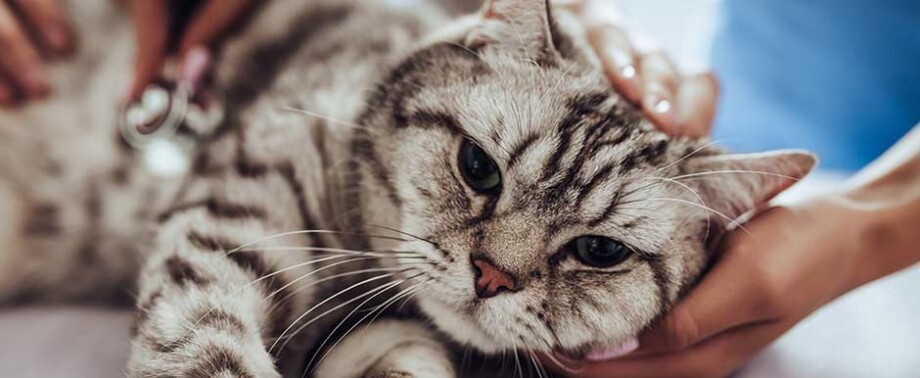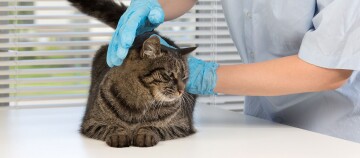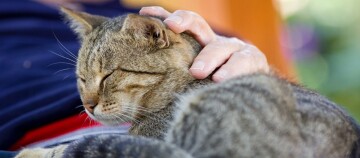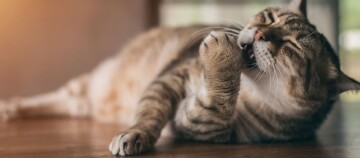Liver Disease in Cats - Monitor the Liver & General Health Conditions
17.10.2022 - Reading time: 3 minutes

The liver represents one of the most important organs in both humans and cats. It has numerous functions, filters toxins from the body, forms and stores various hormones and is responsible for maintaining the nutrient balance.
What are the causes of liver disease in cats?
When your house cat’s liver malfunctions, it’s often due to:
- an obstruction of the bile ducts due to stones
- Infections due to viruses or bacteria
- Damage to the liver as a result of an accident or poison
- the impacts of metabolic diseases such as diabetes mellitus
In addition, seemingly harmless symptoms such as obesity or loss of appetite can lead to liver damage. If your cat is overweight, it can affect the metabolism of fats in the liver and, in the long run, lead to disorders of the organ.
Symptoms of impaired liver function
It is difficult for cat owners to recognise the signs given the many causes of liver disease in cats.
In many cases, your cat may only exhibit a few non-specific characteristics, such as:
- loss of appetite or great thirst
- nausea and vomiting
- weight loss
- diarrhoea
- a lacklustre coat
- weakness and sudden fatigue
In contrast, a relatively conspicuous symptom is jaundice (icterus), in which the eyes and mucous membranes turn yellow.
When you observe your kitty and notice that they are no longer really fit, it’s time for a check-up with the vet. A basic physical examination with scans, urine tests and blood tests can quickly uncover liver disease.
Medical emergency: hepatic lipidosis - when the cat's fat metabolism is disrupted
Exercise extreme caution if your cat refuses to eat or cannot eat food for several days in a row. For instance, this may occur if it has been confined, if its mouth is injured or if it is unable to eat due to nausea and vomiting. In this case, the liver switches to fat metabolism and begins to use up the fat deposits stored in the body to produce energy. In the long run, the liver is not able to cope with such a large amount of fat constituents; this leads to so-called fatty degeneration of the liver, whereby the liver cells gradually die off.
Important: If your cat does not eat for several days, you are dealing with an acute emergency. It must be taken to the vet or animal hospital as soon as possible, as it can no longer eat on its own and has a life-threatening condition.
The treatment for liver diseases in cats can help your house cat
In order to reduce liver values in cats, vets generally prescribe medications that stabilise the circulation and blood flow for the liver. Furthermore, they treat the cause for the liver disorder, if it is known.
For a bacterial infection, under certain circumstances the administration of antibiotics is appropriate after an accident for the treatment of injuries. The long-term goal is to relieve the stress on the animal’s liver and reduce the consequences of a liver illness. This is very successful with a special diet.
Liver diet - which food is recommended for cats with liver disease?
A liver-friendly diet should provide your kitty with enough energy and nutrients for it to maintain its weight. At the same time, the aim is to keep toxins in the body to a minimum, as the liver’s detoxification function is impaired. In addition, this type of diet enables the organ to heal and regenerate damaged areas.
It is best that you feed special food to a cat with liver disease. It includes:
- easily digestible ingredients
- protein that creates few toxins when broken down
- a high percentage of fats and carbohydrates in order to ensure the energy supply for your cat even with reluctant food intake
- a variety of vitamins and minerals because cats with liver disease have a greater need for this
You should pay attention to the following for feed:
- Offer your cat several small portions of food distributed throughout the day.
- Because the food has many calories, it is important that the animal is weighed regularly to avoid obesity.
- It is necessary to give cat food that is gentle on the liver throughout your cat’s life.
- The liver diet applies for snacks and small extras as well. Be sure to buy suitable products.
If you adhere to the diet consistently, your cat can continue to have a mostly normal life despite liver disease. It is important that you keep your periodic follow-up appointments in order to monitor the liver values and general health condition



